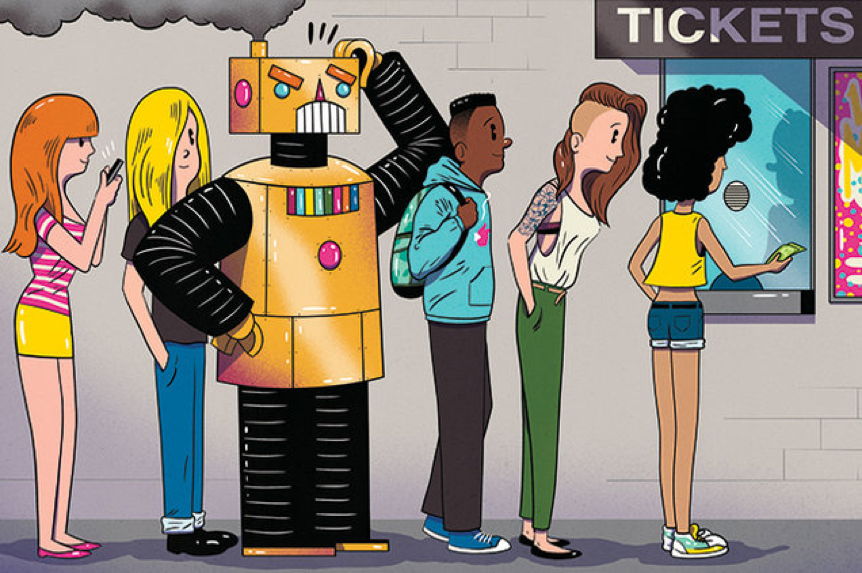By Kaitlyn Stone
It’s happened to all of us. Our favorite band goes on tour, or our favorite sports team goes to the playoffs, or a show that we are dying to see comes to Broadway. We try to get tickets but we forget what time they go on sale, or the site crashes and by the time we get back to the checkout, they are gone – or worse, three times the amount we were expecting to pay for them.
One of the most extreme examples of this is the current Broadway phenomenon, Hamilton: An American Musical. An instant Broadway hit, it seems like everyone wants to get their hands on some tickets to the show. But because the show is sold out for the next year and the only tickets available on resale sites starts at around $800 per ticket, this is very unlikely for most people. Even with the addition of productions in Chicago and Los Angeles, plus a touring company, tickets are still difficult to get a hold of – denying access to the show for most average Americans. Is it purely the shows popularity that makes it such a hot ticket (pun intended)? Or is there another force working behind the scenes?
As it turns out, it may be a little of both. A major culprit behind the price hike in resale tickets is online “ticket bots.” Hackers and scalpers use these bots to purchase thousands of tickets for popular shows and concerts, restricting the ability of average consumers to buy them directly from the ticket site or venue. Once they have purchased these tickets and the show is sold out, they will resell the tickets they purchased at highly inflated prices, out pricing most individuals.
Congress responded to this issue late last year by passing the Better Online Ticket Sales (BOTS) Act of 2016. This legislation prevents the circumvention of security measures on ticket and venue websites aimed at limiting the number of tickets that a single user is able to purchase. The act also prohibits the sale of tickets in interstate commerce when the seller participated in the circumvention or knew or should have known about the circumvention. The Federal Trade Commission under the unfair or deceptive acts and practices statute will enforce the Act. Those who are found guilty of circumventing these security measures will be responsible for a fine of up to $16,000.
While the Act is aimed at increasing accessibility to reasonably priced tickets to events of more than 200 people, some major ticket issuers have some doubts as to whether or not this legislation will actually solve the problem. Stubhub lobbied for legislation that would force new disclosure rules on Ticketmaster and prohibit paperless tickets in an effort to allow themselves to maintain a higher inventory of tickets. Alternatively, Ticketmaster wanted legislation that would prevent brokers from listing tickets that they don’t actually own. While clearly motivated by their own respective economic interests, both sites are wary that more drastic measures were not taken. One criticism is that the Act is unclear on how exactly the FTC will go after ticket bot users. It is also unclear how different federal agencies – and private companies such as Ticketmaster and Stubhub – may need to cooperate in order to begin down larger scalper operations.
Whether or not this legislation is hard enough on the use of ticket bots remains to be seen. However, many supporters of the bill seem to be very optimistic about it’s potential effect on the market. The Act passed both the Senate and House of Representatives with unanimous consent, illustrating Congress’ belief that this bill will have lasting effects. Even Broadway big shot, Lin-Manuel Miranda (creator of Hamilton) has shown his support of the legislation back when it was in its initial stages. Support by someone that is very much involved in the industry that is so affected by the presence of ticket bots, shows that the industry as a whole may be hopeful about the changes that this legislation could lead to.
It may take some time before this legislation is able to increase access to tickets for live events, concerts and sports for the average consumer. The change will not happen overnight. So until then, I suppose I will just have to keep listening to the Hamilton soundtrack on repeat.
Link: http://www.npr.org/sections/thetwo-way/2016/12/08/504843205/bots-b-gone-congress-bans-ticket-scalpers-tool-blamed-for-quick-sell-outs
Student Bio: Kaitlyn Stone is a staff member on the Journal of High Technology Law. She is currently a 2L student at Suffolk University Law School and a life-long lover of all things Broadway.
Disclaimer: The views expressed in this blog are the views of the author alone and do not represent the views of JHTL or Suffolk University Law School.

